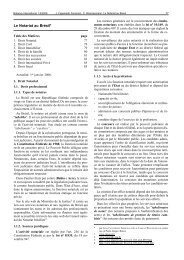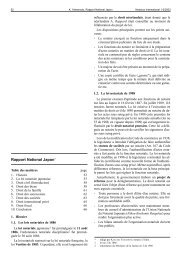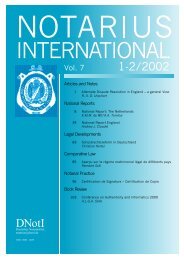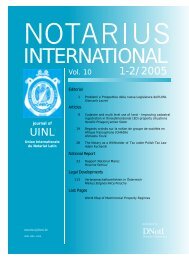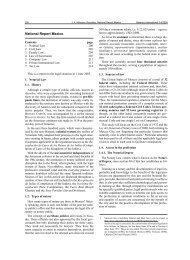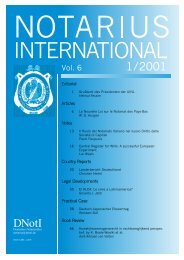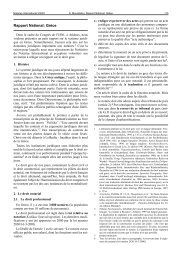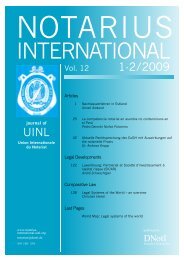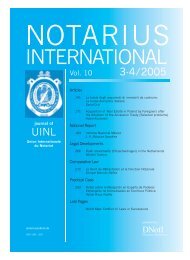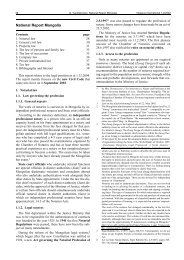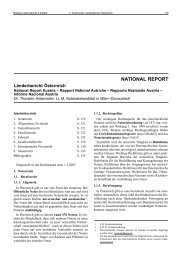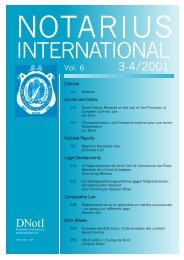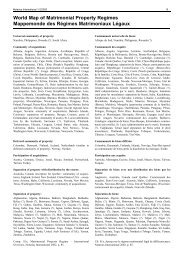ARTICLES and NOTES - Notarius International
ARTICLES and NOTES - Notarius International
ARTICLES and NOTES - Notarius International
You also want an ePaper? Increase the reach of your titles
YUMPU automatically turns print PDFs into web optimized ePapers that Google loves.
<strong>Notarius</strong> <strong>International</strong> 3-4/2002 T. Antenreiter, National Report Austria 143<br />
A written contract of formation must be concluded<br />
<strong>and</strong> registered by all members in the Companies Register.<br />
Registration brings the EEIG into being. From this<br />
time the EEIG is an independent holder of rights <strong>and</strong> duties,<br />
it is a trading company (H<strong>and</strong>elsgesellschaft) within<br />
the meaning of the Commercial Code <strong>and</strong> a merchant by<br />
virtue of its legal form, but it is not a legal entity 88 . The<br />
main statutory source is the currently valid version of the<br />
European Economic Interest Grouping Implementation<br />
Law 1995 (EWIV-Ausführungsgesetz: EWIVG).<br />
6.3. Associations <strong>and</strong> companies limited by shares<br />
6.3.1. Association<br />
An association (Verein) is a combination of several entities<br />
with separate legal personality for the attainment<br />
of a joint purpose; it cannot, however, be set up for the realisation<br />
of profits 89 . The rules <strong>and</strong> regulations governing<br />
it can, in principle, be agreed freely, but they must then<br />
be submitted to <strong>and</strong> lodged in writing with the competent<br />
authority, which in exceptional cases can refuse the<br />
formation of the association within a certain time limit.<br />
A central register of associations does not exist at the<br />
present time in Austria, but provision has already been<br />
made for such a register by statute. The source of law is<br />
the currently valid version of the new Law on Associations<br />
2002 (Vereinsgesetz).<br />
6.3.2. Private limited companies (GmbH)<br />
The private limited company (Gesellschaft mit beschränkter<br />
Haftung: GesmbH or GmbH) is the most<br />
commonly used legal form in Austria for a company limited<br />
by shares <strong>and</strong> it involves one or more shareholders<br />
participating in the company by making capital contributions.<br />
The minimum share capital of the company must<br />
be 35,000.00 € of which at least one half must be paid up<br />
when the company is formed 90 . The participating members<br />
are in principle only liable to the extent of the<br />
amount of their capital contribution <strong>and</strong> not to the extent<br />
of their other personal assets.<br />
For the formation of a private limited company there<br />
has to be a written company contract (equivalent to the<br />
UK memor<strong>and</strong>um <strong>and</strong> articles of association) between<br />
the members or a declaration concerning the incorporation<br />
of a company in the case of a sole shareholder<br />
(single-member incorporation), in both cases in the<br />
form of a notarial instrument 91 . The company contract<br />
or declaration must contain the following:<br />
- company name with the suffix “Gesellschaft mit beschränkter<br />
Haftung” or a corresponding abbreviation<br />
(Ges.m.b.H., GesmbH, G.m.b.H., GmbH)<br />
- registered office<br />
- company objects<br />
- share capital<br />
- name of the participating members <strong>and</strong> the amount of<br />
the initial contribution of each member<br />
- duration of the company<br />
A private limited company is a legal entity <strong>and</strong> thus an<br />
independent holder of rights <strong>and</strong> duties; it is represented<br />
externally by one or more directors. The legal entity<br />
comes into being in external terms upon its computerised<br />
registration in the Companies Register of the Republic<br />
of Austria 92 . All private limited companies have<br />
merchant status through their registration in the Companies<br />
Register.<br />
The following documents are necessary in every case<br />
for registration in the Companies Register:<br />
- an official copy of the company contract or the declaration<br />
concerning the incorporation of a private limited<br />
company<br />
- members’ resolution concerning the appointment of<br />
the director or directors <strong>and</strong> their authority to represent<br />
the company<br />
- specimen corporate signature by the director or directors<br />
- bank confirmation evidencing the paying in of at least<br />
half of the share capital<br />
- self-assessment declaration or fiscal clearance certificate<br />
from the Tax Office as proof of payment of the<br />
Capital Contribution <strong>and</strong> Transfer Tax (Gesellschaftssteuer)<br />
(1% of the paid-up share capital) 93<br />
The involvement of a notary is further necessary, for<br />
example, in the case of declarations concerning acceptance<br />
of new capital contributions, the transfer of shares<br />
<strong>and</strong> agreements concerning the future assignment of<br />
shares, resolutions concerning changes to the company<br />
contract <strong>and</strong> the dissolution of the company, <strong>and</strong> also in<br />
the case of various re-organisation measures (mergers,<br />
split-offs <strong>and</strong> conversions) 94 .<br />
The main statutory source is the currently valid version<br />
of the Law on Private Limited Companies 1906 (GmbH-<br />
Gesetz).<br />
6.3.3. Public limited companies (AG)<br />
The public limited company (Aktiengesellschaft: AG)<br />
is the classic basic form for a company limited by shares.<br />
In contrast to personal companies, the personal labour input<br />
of the shareholders is not the main focus, but rather<br />
their capital contributions. As a rule it is a characteristic<br />
of a public limited company that its shareholders’ professional<br />
interests lie elsewhere <strong>and</strong> the capital contribution<br />
is viewed merely as an investment. Accordingly, the<br />
management <strong>and</strong> control have a greater significance than<br />
is the case with personal companies.<br />
88 Art.1 EEIG Implementation Law<br />
89 Art. 1 Law on Associations<br />
90 Arts. 6 <strong>and</strong> 6a Law on Private Limited Companies<br />
91 Art. 4 Law on Private Limited Companies<br />
92 Art. 2 Law on Private Limited Companies<br />
93 Self-assessment of the Capital Contribution <strong>and</strong> Transfer Tax operates<br />
in the same way as self-assessment of Property Transfer Tax. On<br />
self-assessment see in detail No. 8. (Tax law)<br />
94 See Wagner/Knechtel, Law on Notaries Public, on Art. 1 Law on Notarial<br />
Instruments, page 695



